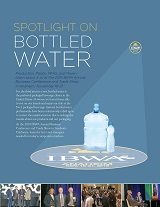The bottled water industry continues to respond to the ongoing water crisis in Flint, Michigan. This is a terrible situation that highlights the important and historic role that bottled water plays during emergencies and natural disasters.
Working in coordination with state, county, and municipal emergency management agencies, and emergency relief partners like Convoy of Hope, International Bottled Water Association (IBWA) member companies have increased bottled water donations, totaling nearly 3 million bottles so far.
Member companies are also coordinating their donations through the Food Bank of Eastern Michigan and directly with the City of Flint. A major effort was recently announced by Nestle Waters North America, Walmart, Coke, and Pepsi to provide up to 6.5 million bottles of water to approximately 10,000 Flint public school students through the end of 2016. The companies also encourage the public to get involved by visiting www.good360.org/flint to make donations that will go directly to local nonprofits serving the community.
Getting Bottled Water to Flint
The bottled water industry has always been at the forefront of relief efforts during emergencies, natural disasters, and other catastrophic events. Throughout the years, bottled water companies have immediately responded to the need for clean water after disasters such as hurricanes, earthquakes, tornados, wildfires, and flooding.
IBWA has offered its assistance to Michigan Governor Rick Snyder and Flint Mayor Karen Weaver. Our continuing efforts are focused on helping provide Flint residents impacted by the lead-contaminated public water supply with reliable access to safe drinking water. Safe, clean drinking water is important to everyone’s survival, but when public water supplies are compromised, bottled water is a necessary, vital, and reliable source of clean, safe drinking water.
The situation in Flint is particularly complex because the lead–contamination of the public water system is the crisis, making bottled water a vital necessity for almost all water needs, from consumption to bathing. For a review of federal lead in drinking water regulations, please click here.
Getting the Information Out
IBWA just launched a “Bottled Water & Flint” webpage on www.bottledwater.org located under the “Issues” tab on the menu bar. This page is a helpful resource for the public and media. Content includes information about lead regulations for both bottled water and the public water supply, testing, and recycling. The page will also provide updates on the bottled water industry’s activities related to the Flint crisis.
We have been utilizing both traditional and social media channels to help communicate the industry response to the Flint crisis. IBWA has issued two press releases, been interviewed by several news outlets, and provided information for many stories about the need for bottled water during emergencies like Flint. While it may surprise some people, the fact is that most bottled water companies are reluctant to talk about the frequency with which they supply bottled water to those in need – it is seen as a normal business practice and not something about which they boast.
The Importance of Recycling
A strong supporter of recycling, the bottled water industry has long encouraged the development of effective and innovative locally-focused curbside and away-from-home recycling programs. The most recent example of this commitment is IBWA’s announcement that is has joined The Recycling Partnership, an innovative organization that utilizes public-private partnerships to improve recycling at the local level and make recycling easier for Americans. The Partnership supports community recycling programs in their efforts to be more accessible and more efficient and engages the full recycling supply chain: from local government to industry end markets, haulers, material recovery facilities, and converters.
With the rapid influx of bottled water into Flint, we are also working to address the importance of recycling. IBWA is a member of the Michigan Recycling Partnership and supports the innovative Recycle By Design program backed by Governor Snyder. The program is a challenge created to incentivize and accelerate the development and implementation of innovative strategies to increase overall recycling in Michigan. We also support the City of Flint’s instituting a new recycling program specifically designed to capture bottled water bottles.
Supporting Public Water Systems
The bottled water industry supports a strong public water system, which is important for providing citizens with clean and safe drinking water. In fact, many bottled water companies use public water sources for their purified bottled water products, however, purified bottled water is not just tap water in a bottle. Once the water enters the bottled water plant several processes are employed to ensure that it meets U.S. Food and Drug Administration (FDA) standards for purified water. These treatments can include utilizing a multi-barrier approach. Measures in a multi-barrier approach may include one or more of the following: reverse osmosis, distillation, micro-filtration, carbon filtration, ozonation, and ultraviolet (UV) light. The finished water product is then sealed in a bottle under sanitary conditions and sold to the consumer.
IBWA also supported President Obama signing into law the Water Resources Reform and Development Act of 2014. This important law supports a strong American public water infrastructure and creates the Water Infrastructure Finance and Innovation Authority (WIFIA). This program will provide low-interest federal loans to communities, which will reduce the cost of financing large water and wastewater infrastructure projects.
To learn more about bottled water, please visit www.bottledwater.org.



























